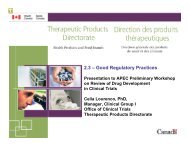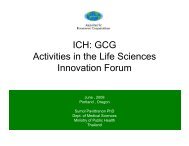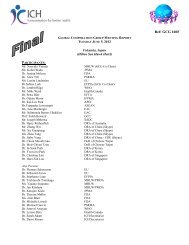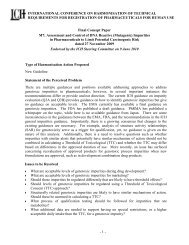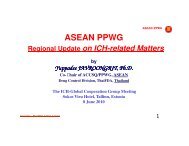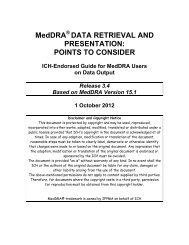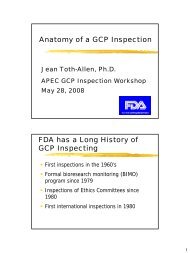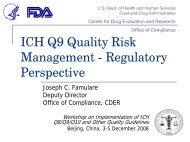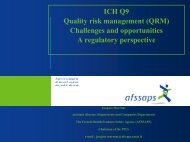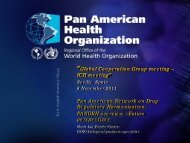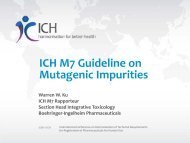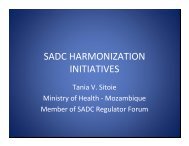Review of GCP: Goals, Principles, Roles and Responsibilities - ICH
Review of GCP: Goals, Principles, Roles and Responsibilities - ICH
Review of GCP: Goals, Principles, Roles and Responsibilities - ICH
You also want an ePaper? Increase the reach of your titles
YUMPU automatically turns print PDFs into web optimized ePapers that Google loves.
<strong>Review</strong> <strong>of</strong> <strong>GCP</strong>:<br />
<strong>Goals</strong> /<strong>Principles</strong>/<br />
<strong>Roles</strong>/<strong>Responsibilities</strong><br />
David A. Lepay M.D., Ph.D., <strong>and</strong><br />
Jean Toth-Allen, Ph.D.<br />
APEC <strong>GCP</strong> Inspection Workshop<br />
May 27, 2008<br />
What This Lecture will<br />
Address/<strong>Review</strong><br />
• Key Activities in a Clinical Trial<br />
• The Process Approach<br />
• Brief History <strong>of</strong> <strong>GCP</strong> (U.S. <strong>and</strong> international)<br />
• <strong>Goals</strong> <strong>and</strong> <strong>Principles</strong> <strong>of</strong> <strong>GCP</strong><br />
• <strong>Roles</strong> <strong>and</strong> <strong>Responsibilities</strong> Under <strong>GCP</strong><br />
• Investigators<br />
• Sponsors/Contract Research Organizations<br />
• Ethics Committees<br />
1
Inspector’s View <strong>of</strong> a<br />
Clinical Trial<br />
• Premise: A clinical trial can be viewed as a<br />
series <strong>of</strong> key activities<br />
• WHO H<strong>and</strong>book for <strong>GCP</strong> identifies 15 key<br />
activities in conducting a single clinical study<br />
• The order <strong>of</strong> these activities may vary<br />
• Activities may be completed simultaneously<br />
• Multiple parties (including the investigator ---<br />
but also the sponsor, ethics committee[s], <strong>and</strong><br />
regulator[s]) are responsible for the success <strong>of</strong><br />
each <strong>of</strong> these activities<br />
Key Activities <strong>and</strong> The<br />
Process Approach<br />
• Thesis: To achieve quality <strong>of</strong> the clinical<br />
trial as a whole, quality must be defined,<br />
controlled, <strong>and</strong> assured for each key<br />
activity<br />
• An inspection should address each <strong>of</strong> the<br />
key activities that take place at the<br />
inspected site <strong>and</strong> for which the inspected<br />
party is responsible<br />
2
Thinking Like an Inspector:<br />
Questions to Ask -1-<br />
• What are these 15 key activities ?<br />
• Which <strong>of</strong> these 15 are the responsibility <strong>of</strong><br />
the party I am inspecting ?<br />
The 15 Key Activities in a<br />
Regulated Clinical Trial -1-<br />
1. Development <strong>of</strong> the Study Protocol<br />
2. Development <strong>of</strong> Written St<strong>and</strong>ard Operating<br />
Procedures (SOPs)<br />
3. Development <strong>of</strong> Support Systems <strong>and</strong> Tools<br />
4. Generation <strong>and</strong> Approval <strong>of</strong> Study-Related<br />
Documents<br />
5. Selection <strong>of</strong> Study Sites <strong>and</strong> Qualified<br />
Investigators<br />
3
The 15 Key Activities in a<br />
Regulated Clinical Trial -2-<br />
6. Ethics Committee <strong>Review</strong> <strong>and</strong> Approval <strong>of</strong> the<br />
Protocol<br />
7. <strong>Review</strong> by Regulatory Authorities<br />
8. Enrollment <strong>of</strong> Subjects: Recruitment, Eligibility,<br />
<strong>and</strong> Informed Consent<br />
9. The Investigational Product(s): Quality,<br />
H<strong>and</strong>ling, <strong>and</strong> Accounting<br />
10. Conducting the Study: Study Data Acquisition<br />
The 15 Key Activities in a<br />
Regulated Clinical Trial -3-<br />
11. Safety Management <strong>and</strong> Reporting<br />
12. Monitoring the Study<br />
13. Managing Study Data<br />
14. Quality Assurance <strong>of</strong> Study Performance <strong>and</strong><br />
Data<br />
15. Reporting the Study<br />
4
Thinking Like an Inspector:<br />
Questions to Ask -2-<br />
• What information do I have about each key<br />
activity before I start the inspection ?<br />
• What do I ask/review on-site to assess<br />
each key activity ?<br />
• What are the inspected party’s<br />
responsibilities in each key area <strong>and</strong> what is<br />
the st<strong>and</strong>ard I use to evaluate these ?<br />
<strong>GCP</strong>: Origins in the Successes<br />
<strong>and</strong> Failures <strong>of</strong> Research<br />
• Successes<br />
• Scientific Method <strong>and</strong> Evidence-Based Medicine<br />
• <strong>Principles</strong> <strong>of</strong> Conduct (Hippocratic Oath <strong>and</strong><br />
beyond)<br />
• Failures<br />
• Ethical Atrocities (War-time research; others)<br />
• Scientific Fraud<br />
• Preventable Research Deaths/Injury<br />
5
<strong>GCP</strong> in the U.S.: A Brief<br />
History -1-<br />
• In contrast to GMP (Good Manufacturing<br />
Practices) <strong>and</strong> GLP (Good Laboratory<br />
Practices: for animal toxicology studies), the<br />
term “Good Clinical Practice” (or <strong>GCP</strong>) does<br />
not appear in U.S. law or FDA regulations<br />
• But FDA has a long history <strong>of</strong> regulating <strong>and</strong><br />
inspecting clinical research<br />
<strong>GCP</strong> in the U.S.: A Brief<br />
History -2-<br />
• 1960’s<br />
• Requirement for “adequate <strong>and</strong> well-controlled<br />
clinical investigations” to support marketing<br />
applications<br />
• Requirement for research permits (IND) to<br />
conduct human subjects research with<br />
investigational products<br />
• First FDA inspections <strong>of</strong> clinical investigators<br />
6
<strong>GCP</strong> in the U.S.: A Brief<br />
History -3-<br />
• 1970’s<br />
• FDA regulations for each <strong>of</strong> the parties involved<br />
in clinical research<br />
• Clinical Investigators<br />
• Sponsors/Monitors/ Contract Research<br />
Organizations<br />
• Ethics Committees (IRBs/IECs)<br />
• Comprehensive Bioresearch Monitoring (BIMO)<br />
Program <strong>of</strong> inspections: Inspecting each party<br />
• Extension <strong>of</strong> law/regulations to medical devices<br />
<strong>GCP</strong> in the U.S.: A Brief<br />
History -4-<br />
• 1980’s<br />
• Acceptance <strong>of</strong> non-U.S. studies in support <strong>of</strong><br />
a U.S. marketing application<br />
• A marketing application (NDA; PMA) can be<br />
submitted to the U.S. with only foreign<br />
studies --- no requirement for a U.S. study<br />
• FDA began inspection <strong>of</strong> clinical investigators<br />
<strong>and</strong> sponsors outside <strong>of</strong> the U.S.<br />
7
FDA CI International Inspections*<br />
Algeria** 1<br />
Argentina 19<br />
Australia 9<br />
Austria 6<br />
Bahamas 1<br />
Belgium 26<br />
Brazil 13<br />
Bulgaria 1<br />
Canada 151<br />
Chile 8<br />
China 7<br />
China, Taipei 3<br />
Colombia 1<br />
Costa Rica 8<br />
Czech Republic 7<br />
Croatia 3<br />
Denmark 13<br />
Dominican Rep. 1<br />
Ecuador 1<br />
Egypt 1<br />
Estonia 5<br />
Finl<strong>and</strong> 15<br />
France 51<br />
Gabon 1<br />
Germany 59<br />
Greece 2<br />
Guatemala 2<br />
Hong Kong 5<br />
Hungary 10<br />
India 6<br />
Irel<strong>and</strong> 1<br />
Israel 5<br />
Italy 36<br />
Japan 3<br />
Kenya 1<br />
Latvia 5<br />
Lithuania 2<br />
Malawi 1<br />
Malaysia 4<br />
Mexico 14<br />
Netherl<strong>and</strong>s 24<br />
New Zeal<strong>and</strong> 4<br />
Nigeria** 1<br />
Norway 5<br />
Panama 2<br />
Peru 6<br />
Philippines 4<br />
Pol<strong>and</strong> 29<br />
Portugal 2<br />
Romania 1<br />
Russia 35<br />
Serbia 3<br />
Singapore 1<br />
Slovenia 1<br />
South Africa 26<br />
Spain 17<br />
Sweden 28<br />
Switzerl<strong>and</strong> 2<br />
Thail<strong>and</strong> 4<br />
Turkey 6<br />
U. K. 91<br />
Ukraine 4<br />
Venezuela 2<br />
Yugoslavia 3<br />
Zambia 1<br />
*Conducted for FDA/CDER<br />
from 1980 through 08/8/07; total: 810<br />
**data reviewed in U.S.<br />
<strong>GCP</strong> in the U.S.: A Brief<br />
History -5-<br />
• 1990’s:<br />
• International <strong>GCP</strong> harmonization through <strong>ICH</strong><br />
(International Conference on Harmonization)<br />
• Harmonization between industry <strong>and</strong><br />
regulators in U.S., European Union, <strong>and</strong> Japan<br />
• First “formal” use <strong>of</strong> the term <strong>GCP</strong> at FDA<br />
• Resulted in <strong>ICH</strong> <strong>GCP</strong> (E6) Consolidated<br />
Guideline<br />
• Published in the U.S. in May 1997 as <strong>of</strong>ficial<br />
FDA “guidance”<br />
8
<strong>GCP</strong> in the 21 st Century<br />
• Beyond Drugs/Biologics<br />
• ISO 14155-1: Clinical Investigation <strong>of</strong> medical devices<br />
for human subjects: General requirements (2002)<br />
• Global Harmonization Task Force (GHTF)<br />
• Globalization<br />
• PAHO/PANDRH “Good Clinical Practices: Document <strong>of</strong> the<br />
Americas” (2004)<br />
• WHO “H<strong>and</strong>book for Good Clinical Practice (<strong>GCP</strong>):<br />
Guidance for Implementation” (2005/2006)<br />
• Global Acceptance <strong>and</strong> Expectation<br />
• FDA proposed “new” rule for acceptance <strong>of</strong> non-U.S.<br />
studies: expects compliance with international <strong>GCP</strong><br />
<strong>GCP</strong>: Overarching Themes<br />
• Responsibility(-ies)<br />
• Attention to Detail<br />
• Documentation<br />
• Quality<br />
• Data/Scientific Quality; Ethical Quality;<br />
Process Quality<br />
• Risk <strong>and</strong> Risk Management<br />
• Validation/Verification/Inspection<br />
9
The Hierarchy <strong>of</strong> <strong>GCP</strong><br />
<strong>Goals</strong><br />
<strong>Principles</strong><br />
<strong>Roles</strong><br />
<strong>Responsibilities</strong><br />
Requirements<br />
Application to the Specific Clinical Trial<br />
The <strong>Goals</strong> <strong>of</strong> <strong>GCP</strong> –1-<br />
• Protecting Research Subjects<br />
• Subject safety<br />
• Rights as subjects (research ethics)<br />
• Right to be informed<br />
• Right NOT to participate<br />
• Right to withdraw at any time<br />
• Right to protection <strong>of</strong> privacy<br />
• …<strong>and</strong> other Rights<br />
10
The <strong>Goals</strong> <strong>of</strong> <strong>GCP</strong> –2-<br />
• Ensuring the quality <strong>and</strong> integrity <strong>of</strong> research<br />
data for regulatory decision-making<br />
• Based on a scientifically sound protocol that is<br />
designed to meet its stated objectives<br />
• Based on the quality conduct <strong>and</strong> oversight <strong>of</strong><br />
the clinical study<br />
The <strong>Goals</strong> <strong>of</strong> <strong>GCP</strong> –3-<br />
• Assuring the existence <strong>and</strong> operation <strong>of</strong><br />
“quality systems”<br />
• Including but not just for the current study<br />
• By each party (investigator, sponsor, IEC, <strong>and</strong><br />
regulatory authority)<br />
• Based on written procedures<br />
• Assured through self- <strong>and</strong> cross-evaluation<br />
• Leveraged: Regulatory authority can’t do it all<br />
11
The <strong>Principles</strong> <strong>of</strong> <strong>GCP</strong><br />
• The identification <strong>of</strong> <strong>Principles</strong> <strong>of</strong> <strong>GCP</strong> was/is a major<br />
achievement <strong>of</strong> <strong>ICH</strong> <strong>GCP</strong> carried through to all other<br />
international <strong>GCP</strong> guidelines (ISO, PAHO, WHO…)<br />
• Each <strong>of</strong> the 13 <strong>Principles</strong> can be linked to one or more<br />
<strong>of</strong> the goals <strong>of</strong> <strong>GCP</strong><br />
• The <strong>GCP</strong> <strong>Principles</strong> reflect internationally accepted<br />
ethical <strong>and</strong> quality principles found in other<br />
internationally accepted documents<br />
• Achieving a Principle requires that each party <strong>and</strong> all<br />
parties together meet their corresponding<br />
responsibilities<br />
A Listing <strong>of</strong> the <strong>Principles</strong><br />
• #1: Trials should be conducted in<br />
accordance with basic ethical principles,<br />
which have their origin in the Declaration <strong>of</strong><br />
Helsinki.<br />
• #2: Before a trial is initiated, foreseeable<br />
risks <strong>and</strong> discomforts <strong>and</strong> any anticipated<br />
benefit(s) for the individual trial subject <strong>and</strong><br />
society should be identified.<br />
12
A Listing <strong>of</strong> the <strong>Principles</strong><br />
• #3: A trial should be initiated <strong>and</strong> continued<br />
only if the anticipated benefit(s) for the<br />
individual trial subject <strong>and</strong> society clearly<br />
outweigh the risks.<br />
• Although the benefit <strong>of</strong> the results <strong>of</strong> the trial<br />
to science <strong>and</strong> society should be taken into<br />
account, the most important considerations are<br />
those related to the rights, safety, <strong>and</strong> wellbeing<br />
<strong>of</strong> the trial subjects.<br />
A Listing <strong>of</strong> the <strong>Principles</strong><br />
• #4: The trial should be conducted in<br />
compliance with the protocol that has received<br />
prior institutional review board<br />
(IRB)/independent ethics committee (IEC)<br />
approval/favorable opinion.<br />
• #5: Approval <strong>of</strong> trials <strong>of</strong> investigational<br />
products or procedures should be supported<br />
by adequate non-clinical <strong>and</strong>, when applicable,<br />
clinical information.<br />
13
A Listing <strong>of</strong> the <strong>Principles</strong><br />
• #6: A trial should be scientifically sound, <strong>and</strong><br />
described in a clear, detailed protocol.<br />
• #7: Freely given informed consent should be<br />
obtained from every subject prior to trial<br />
participation in accordance with national<br />
culture(s) <strong>and</strong> requirements. When the<br />
subject is mentally or legally incapable,<br />
consent should be obtained from a legally<br />
acceptable representative.<br />
A Listing <strong>of</strong> the <strong>Principles</strong><br />
• #8: Qualified medical personnel (i.e.,<br />
physician or, when appropriate dentist) should<br />
be responsible for the medical care <strong>of</strong> trial<br />
subjects, <strong>and</strong> for any medical decision made<br />
on their behalf.<br />
• #9: Each individual involved in conducting a<br />
trial should be qualified by education, training,<br />
<strong>and</strong> experience to perform his or her<br />
respective task(s) <strong>and</strong> currently licensed to do<br />
so, where required.<br />
14
A Listing <strong>of</strong> the <strong>Principles</strong><br />
• #10: All clinical trial information should be<br />
recorded, h<strong>and</strong>led, <strong>and</strong> stored in a way that<br />
allows its accurate reporting, interpretation,<br />
<strong>and</strong> verification.<br />
• #11: The confidentiality <strong>of</strong> records that could<br />
identify subjects should be protected,<br />
respecting the privacy <strong>and</strong> confidentiality rules<br />
in accordance with the applicable regulatory<br />
requirement(s).<br />
A Listing <strong>of</strong> the <strong>Principles</strong><br />
• #12: Investigational products should be<br />
manufactured, h<strong>and</strong>led, <strong>and</strong> stored in<br />
accordance with applicable Good<br />
Manufacturing Practice (GMP) <strong>and</strong> should be<br />
used in accordance with the approved<br />
protocol.<br />
• #13: Systems with procedures that assure the<br />
quality <strong>of</strong> every aspect <strong>of</strong> the trial should be<br />
implemented.<br />
15
<strong>Goals</strong> <strong>and</strong> <strong>Principles</strong> <strong>of</strong> <strong>GCP</strong>:<br />
Thinking Like an Inspector<br />
• Violations so serious as to compromise the<br />
goals <strong>and</strong> principles <strong>of</strong> <strong>GCP</strong>:<br />
• Are the most important to detect in<br />
inspection<br />
• Are most likely to result in <strong>of</strong>ficial<br />
(enforcement) action<br />
• Must be most thoroughly documented<br />
<strong>Roles</strong> <strong>and</strong> <strong>Responsibilities</strong>:<br />
The Framework <strong>of</strong> the Inspection<br />
16
Responsible Parties<br />
• Study sponsor/contract research<br />
organization (CRO)<br />
• Clinical investigators (CIs)<br />
• Independent Ethics Committee<br />
(IEC)/Institutional <strong>Review</strong> Board (IRB)<br />
Shared <strong>Responsibilities</strong><br />
• <strong>Responsibilities</strong> overlap – system <strong>of</strong><br />
checks <strong>and</strong> balances<br />
• Non-compliance by any party does not<br />
eliminate need for other parties to be<br />
compliant<br />
• FDA regulations <strong>and</strong> <strong>ICH</strong> <strong>GCP</strong> definitions –<br />
similar <strong>and</strong> include/imply responsibilities<br />
17
SPONSORS<br />
Sponsor -1-<br />
• Definition: An individual, company, institution,<br />
or organization that takes responsibility for<br />
the initiation, management, <strong>and</strong>/or financing<br />
<strong>of</strong> a clinical trial<br />
• Includes: commercial (pharmaceutical <strong>and</strong><br />
device) companies, government funding<br />
agencies, private foundations, <strong>and</strong> individuals<br />
• Sponsor-investigators – must comply with<br />
both sponsor <strong>and</strong> investigator responsibilities<br />
18
Sponsor -2-<br />
• <strong>GCP</strong> requires certain direct<br />
communications <strong>and</strong> interactions<br />
between the sponsor <strong>and</strong> the<br />
regulatory authority<br />
Contract Research<br />
Organization (CRO)<br />
• A person or an organization (commercial,<br />
academic, or other) contracted by the<br />
sponsor to perform one or more <strong>of</strong> a<br />
sponsor’s trial-related duties <strong>and</strong> functions<br />
• FDA’s pharmaceutical regulation covers<br />
transfer <strong>of</strong> regulatory responsibility; not<br />
addressed in device regulation<br />
• Sponsor ultimately responsible for the<br />
conduct <strong>of</strong> the study<br />
19
Monitor<br />
• Employee <strong>of</strong> the sponsor (or CRO) who<br />
works to oversee the progress <strong>of</strong> a clinical<br />
study through on-site visits <strong>and</strong> other<br />
means<br />
• To ensure that the study is conducted,<br />
recorded, <strong>and</strong> reported in accordance with<br />
the protocol, SOPs, <strong>GCP</strong> <strong>and</strong> the applicable<br />
regulatory requirement(s). (Quality control)<br />
Medical Expert (“Medical<br />
Monitor”)<br />
• Employee <strong>of</strong> the sponsor (or CRO) who is<br />
readily available to advise on trial-related<br />
medical questions or problems<br />
• If necessary, outside consultant(s) may be<br />
appointed for this person<br />
20
Independent Data Monitoring<br />
Committee (DMC; DSMB)<br />
• A committee established by, but acting<br />
independent <strong>of</strong>, the sponsor to assess at<br />
intervals the progress <strong>of</strong> a clinical trial, the<br />
safety data, <strong>and</strong> the critical efficacy<br />
endpoints, <strong>and</strong> to recommend to the sponsor<br />
whether to continue, modify, or stop a trial<br />
• Every study needs safety monitoring; but not<br />
every study requires a DMC/DSMB<br />
Sponsor <strong>Responsibilities</strong> -1-<br />
• Obtain regulatory approval, where<br />
necessary, before initiating a study<br />
• Manufacture <strong>and</strong> label investigational<br />
products appropriately<br />
• Initiate, withhold, or discontinue studies<br />
as required<br />
• Includes protocol development, <strong>of</strong>ten in<br />
consultation with one or more clinical<br />
investigators<br />
21
Sponsor <strong>Responsibilities</strong> -2-<br />
• Refrain from commercialization <strong>of</strong> investigational<br />
products<br />
• Control the distribution <strong>and</strong> return <strong>of</strong><br />
investigational products<br />
• Detailed records<br />
• Pro<strong>of</strong> <strong>of</strong> IEC/IRB approval before initial shipment<br />
• Select qualified clinical investigators<br />
• Credentials can vary by study & country requirements<br />
• “1572” commitments for pharmaceutical studies<br />
• Investigator agreements for medical device studies<br />
Sponsor <strong>Responsibilities</strong> -3-<br />
• Disseminate appropriate information to<br />
investigators<br />
• Commonly = Investigator’s Brochure for<br />
pharmaceutical studies<br />
• Update as necessary<br />
• Select qualified persons to monitor the<br />
conduct <strong>of</strong> the studies<br />
22
Sponsor <strong>Responsibilities</strong> -4-<br />
• Adequately monitor clinical studies<br />
• Written SOPs desirable (required by FDA<br />
device regulation)<br />
• Requires access to site <strong>and</strong> subject records<br />
(privacy laws applicable)<br />
• Provides quality control – for assurance <strong>of</strong><br />
subject protections <strong>and</strong> data integrity<br />
• Enables assurance <strong>of</strong> clinical investigator<br />
compliance<br />
Sponsor <strong>Responsibilities</strong> -5-<br />
• Evaluate <strong>and</strong> report adverse experiences<br />
• Maintain adequate records<br />
• Retention according to regulatory<br />
requirements<br />
• Submit all reports, including safety<br />
reports, annual/progress <strong>and</strong> final reports,<br />
as required<br />
23
Financing/Compensation<br />
• FDA regulations<br />
• Do not address the financing <strong>of</strong> clinical studies or<br />
compensation to research subjects<br />
• Are silent on liability for injury to subjects in a clinical<br />
study<br />
• Address financial disclosure by investigators <strong>and</strong> other<br />
study staff<br />
• <strong>ICH</strong> <strong>GCP</strong> recommends<br />
• The financial aspects <strong>of</strong> the study be documented in an<br />
agreement between the sponsor <strong>and</strong> investigator<br />
• Compensation, insurance, <strong>and</strong> any costs <strong>of</strong> treatment in<br />
the event <strong>of</strong> study-related injury be addressed in the<br />
sponsor’s policies<br />
CLINICAL INVESTIGATOR<br />
24
Clinical Investigator<br />
• <strong>ICH</strong> <strong>GCP</strong> definition: A person responsible for the<br />
conduct <strong>of</strong> the clinical trial at a trial site<br />
• Suggests an investigator at each site; multisite<br />
study may have a coordinating investigator, but<br />
there should be a responsible party at each site<br />
• The investigator is<br />
• THE contact with study subjects<br />
• Responsible for study site compliance with <strong>GCP</strong><br />
Subinvestigator(s)<br />
• FDA does not specifically define<br />
• <strong>ICH</strong> <strong>GCP</strong>: Any individual member <strong>of</strong> the<br />
clinical trial team designated <strong>and</strong><br />
supervised by the investigator at a trial<br />
site to perform critical trial-related<br />
procedures <strong>and</strong>/or make important trialrelated<br />
decisions<br />
25
Investigator <strong>Responsibilities</strong> -1-<br />
• Personally conduct <strong>and</strong>/or supervise the<br />
study<br />
• Cannot contract out any responsibilities; is<br />
entirely responsible for study conduct at site<br />
• Needs to ensure qualifications <strong>and</strong> training <strong>of</strong><br />
anyone delegated study duties <strong>and</strong> meet with<br />
study staff on a regular basis<br />
• SOPs for site’s conduct <strong>of</strong> studies <strong>and</strong><br />
h<strong>and</strong>ling <strong>of</strong> problems<br />
Investigator <strong>Responsibilities</strong> -2-<br />
• Communicate with the IEC/IRB<br />
• Initial approval before initiation <strong>of</strong> study<br />
• Amendments/progress reports/continuing<br />
review<br />
• “Safety” reports<br />
• Ensure proper informed consent process<br />
• IEC/IRB approved form<br />
• Documented prior to any study-related<br />
activities<br />
• If delegated, only to appropriate study staff<br />
26
Investigator <strong>Responsibilities</strong> -3-<br />
• Protocol compliance<br />
• No deviation without prior sponsor <strong>and</strong><br />
IEC/IRB approval – unless to eliminate an<br />
immediate hazard to subjects<br />
• Protocol should be designed to facilitate<br />
compliance<br />
• Control <strong>of</strong> investigational products<br />
• Detailed records – receipt, use, & disposition<br />
• Proper storage <strong>and</strong> h<strong>and</strong>ling – as defined in<br />
the protocol<br />
Investigator <strong>Responsibilities</strong> -4-<br />
• Maintenance <strong>of</strong> r<strong>and</strong>omization <strong>and</strong><br />
blinding; unblinding only for medical<br />
emergencies <strong>and</strong> then fully documented<br />
• Safety reporting<br />
• Recognizing <strong>and</strong> reporting all adverse events<br />
• Special attention to serious <strong>and</strong> unexpected<br />
events – reporting to sponsor <strong>and</strong> IEC/IRB<br />
<strong>and</strong> regulatory bodies as required<br />
27
Investigator <strong>Responsibilities</strong> -5-<br />
• Recordkeeping<br />
• Accurate <strong>and</strong> complete case histories for each<br />
study subject – both those to whom<br />
investigational product was administered <strong>and</strong><br />
controls<br />
• Includes<br />
• Source documents (Hospital charts, clinical laboratory<br />
reports, x-rays, ECGs, subject diaries, pharmacy records)<br />
• Case report forms<br />
• Correspondence<br />
• Other study-related documents – e.g., protocol, with all<br />
amendments; Investigator’s Brochure, screening logs<br />
Investigator <strong>Responsibilities</strong> -6-<br />
• Recordkeeping (cont.)<br />
• Quality <strong>and</strong> integrity <strong>of</strong> data essential<br />
• Maintained as required by applicable<br />
regulations<br />
28
Investigator <strong>Responsibilities</strong> -7-<br />
• Reporting<br />
• Safety reports<br />
• Progress reports<br />
• To sponsor<br />
• To IEC/IRB for continuing review<br />
• Final report<br />
Investigator <strong>Responsibilities</strong> -8-<br />
• Medical care <strong>of</strong> study subjects (<strong>ICH</strong>/WHO)<br />
• Ensure access to reasonable st<strong>and</strong>ard <strong>of</strong> care<br />
• Investigator or other medically qualified<br />
member <strong>of</strong> study team<br />
• Recommends informing subject’s primary<br />
physician <strong>of</strong> participation in the study<br />
29
IEC (U.S. = IRB)<br />
References<br />
• <strong>ICH</strong> Good Clinical Practice Consolidated Guideline<br />
(E6), 1996, Section 3<br />
• Operational Guidelines for Ethics Committees that<br />
<strong>Review</strong> Biomedical Research, World Health<br />
Organization, 2000 (TDRPRDEthics2000.pdf)<br />
• Surveying <strong>and</strong> Evaluating Ethical <strong>Review</strong><br />
Practices: A complementary guideline to the<br />
Operational Guidelines for Ethics Committees that<br />
<strong>Review</strong> Biomedical Research, World Health<br />
Organization, 2002 (TDRPRDEthics2002.pdf)<br />
30
Role <strong>of</strong> an Independent<br />
Ethics Committee (IEC) -1-<br />
• Safeguarding the dignity, rights, safety,<br />
<strong>and</strong> well-being <strong>of</strong> all actual or potential<br />
research participants<br />
• Providing independent, competent, <strong>and</strong><br />
timely ethical review <strong>of</strong> the proposed<br />
study<br />
• Considering both the scientific <strong>and</strong> ethical<br />
aspects <strong>of</strong> the study – since scientifically<br />
unsound research is not ethical<br />
Role <strong>of</strong> the IEC -2-<br />
• To ensure<br />
• Risks to subjects are minimized<br />
• Risks are reasonable in relation to anticipated<br />
benefits<br />
• Selection <strong>of</strong> subjects is equitable<br />
• Informed consent is appropriately conducted<br />
<strong>and</strong> documented<br />
• Subject safety is adequately monitored<br />
• Subject privacy is adequately addressed<br />
31
Rights <strong>of</strong> Research Subjects<br />
• Subjects have the right to<br />
• Be informed<br />
• NOT participate<br />
• Withdraw at any time<br />
• Protection <strong>of</strong> their privacy<br />
• Declaration <strong>of</strong> Helsinki – “In medical research on<br />
human subjects, considerations related to the<br />
well-being <strong>of</strong> the human subject should take<br />
precedence over the interests <strong>of</strong> science <strong>and</strong><br />
society.”<br />
IEC <strong>Responsibilities</strong> -1-<br />
• Membership – must be diverse <strong>and</strong><br />
independent<br />
• At least 5 members<br />
• At least one from nonscientific area<br />
• At least one independent <strong>of</strong> institution/study<br />
site<br />
• Non-voting experts invited as necessary<br />
32
IEC <strong>Responsibilities</strong> -2-<br />
• Obtain <strong>and</strong> review pertinent documents<br />
• Protocols <strong>and</strong> amendments<br />
• Proposed informed consent document<br />
• Subject recruiting materials<br />
• Investigator’s Brochure<br />
• Available safety information<br />
• Investigator’s curriculum vitae, including all<br />
active studies<br />
• Other – as pertinent to specific study <strong>and</strong> IEC<br />
requirements<br />
IEC <strong>Responsibilities</strong> -3-<br />
• Schedule <strong>and</strong> document meetings<br />
• Time for adequate review by all members<br />
• Maintenance <strong>of</strong> detailed minutes<br />
• Written procedures<br />
• Establishment <strong>of</strong> IEC authority<br />
• Definition <strong>of</strong> membership requirements <strong>and</strong> terms<br />
• Meeting schedule <strong>and</strong> quorum requirements<br />
• Details <strong>of</strong> initial <strong>and</strong> continuing review processes<br />
• Recordkeeping requirements<br />
• Procedures to minimize conflict <strong>of</strong> interest<br />
33
IEC <strong>Responsibilities</strong> -4-<br />
• Perform ethical reviews<br />
• Ensure proper expertise for scientific review<br />
• <strong>Review</strong> target subject population to ensure adequate<br />
inclusion/exclusion criteria <strong>and</strong> proper recruiting<br />
• <strong>Review</strong> investigator’s qualifications <strong>and</strong> ability to<br />
supervise <strong>and</strong> conduct the study at the site<br />
• <strong>Review</strong> proposed compensations to investigator <strong>and</strong><br />
subjects<br />
• Consider subject privacy <strong>and</strong> data confidentiality<br />
• <strong>Review</strong> issues that may raise community concerns<br />
• Ensure proposed informed consent process <strong>and</strong> form<br />
are appropriate<br />
IEC <strong>Responsibilities</strong> -5-<br />
• Decision-making<br />
• Normally at a convened meeting where a quorum is<br />
present<br />
• Method for reaching decision should be<br />
predetermined in written procedures (approval,<br />
disapproval, modifications requested,<br />
suspension/termination <strong>of</strong> previously approved study)<br />
• No one with a conflict <strong>of</strong> interest should participate<br />
• Non-members excluded from deliberations <strong>and</strong> vote<br />
34
IEC <strong>Responsibilities</strong> -6-<br />
• Communicating decisions<br />
• In writing to investigator, including<br />
responsibilities an approval entails<br />
• Suggestions for revision when modifications<br />
are required<br />
• Reasons for disapproval or<br />
termination/suspension <strong>of</strong> prior approval<br />
IEC <strong>Responsibilities</strong> -7-<br />
• Continuing review<br />
• As appropriate to risk <strong>of</strong> study, but at least<br />
annually<br />
• Substantive <strong>and</strong> at a convened meeting<br />
• Documentation <strong>and</strong> archiving<br />
• Retention <strong>of</strong> all pertinent study documents<br />
<strong>and</strong> related correspondence<br />
• Maintained at least 3 years after completion<br />
<strong>of</strong> study<br />
35
The IEC:<br />
Closing Perspectives<br />
• The credibility <strong>of</strong> the IEC will affect the<br />
credibility (<strong>and</strong> acceptability) <strong>of</strong> clinical<br />
studies <strong>and</strong> study sites<br />
• Developing “high quality” clinical trials<br />
depends on developing “high quality” IECs<br />
• Developing methods to assess their<br />
adequacy is an important consideration for<br />
regulatory bodies<br />
36
Disclaimer :<br />
The information within this presentation<br />
is based on the presenter's expertise <strong>and</strong><br />
experience, <strong>and</strong> represents the views <strong>of</strong><br />
the presenter for the purposes <strong>of</strong> a<br />
training workshop.



